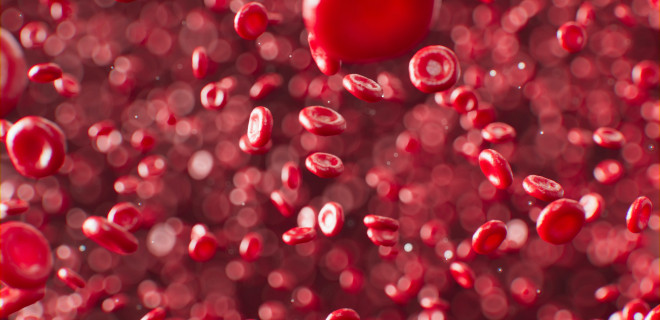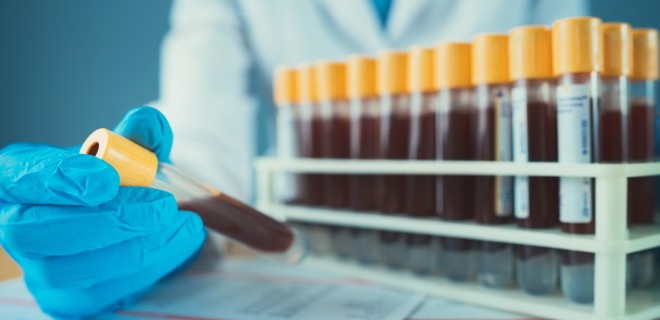
This is the full text of a speech given by Elizabeth at our recent World AIDS Day 2022 event.
Hello everyone and thank you for having me here to speak. My name is indeed Elizabeth, but should you talk to me later on please do feel free to call me Liz or Libby.
I am here to speak about the Infected Blood Inquiry, and I think the best way I can do that is to tell you my family’s story, which is a story revolving around the haemophilia side of the story, rather than 'whole blood' infection side.
My father, Peter, was a severe haemophiliac. Unfortunately he grew up in a time before treatment, so by the time he was in his early 20s, and treatment became available, the damage had already been done to his joints and he couldn’t bend one leg properly, nor straighten one arm. Still, the new treatment (cryo at the time) was very welcome as it helped decrease bleeding episodes, and pain.
Then he was moved onto Factor 8 treatment, like many other haemophiliacs at the time. This was made by pooling together blood donations from hundreds, or even thousands, of people and extracting the Factor. Unfortunately, though with thanks to the Inquiry for shining a light on it, we now know that many of those people who donated blood were either in prison in America, or were paid donors from so-called 'skid row' locations. Unsurprisingly, this led to a large number of haemophiliacs the world over becoming infected with various forms of hepatitis, and eventually with HIV.
My father was one of those. I have seen pictures of my father holding either me or my sister when we are very young, and he is yellow! Clearly he had hepatitis at that time. Luckily for my mum and sister, he did not develop antibodies to HTLV, which is what HIV was called by some doctors and researchers in the early days, until after my sister was born in 1982.
By 1984, however, he had been tested for HTLV and returned a positive result, though he appears not to have been told about that until 1985. He did not tell my mum very much, only that the hospital had said they could not have any more kids, which my mum was very upset about.
We, my sister and I, certainly didn’t realise anything was wrong until the summer of 1991, when I was 12 and my sister was yet to turn 9. Unfortunately that is when my dad was admitted to the Royal Liverpool Hospital, and he never left – he died in early November 1991, not long before Freddie Mercury! It is funny, but a large number of us 'children of the infected' have a very strong affiliation with Freddie because of this – it seems a lot of our fathers died, or became very ill, around that time.
I remember when he was very ill in hospital, we were allowed to take our dog Benji in – and I knew that was bad, because dogs are definitely not allowed in hospitals normally! And I remember he weed and we were all very embarrassed! I also remember a social worker was brought in to talk to my sister and I, and that she told us our dad would not be coming home ever, and that he would die soon. I did not like her and I feel like I made that clear at the time, though now I can only think what a hard job she had!
After I had heard the words HIV and AIDS I made it my solemn duty to learn as much as I could about the illness, especially to find out if there were any cures. I visited my school library, the local library, and on one particularly memorable occasion I managed to get into Liverpool University library – don’t ask me how, at 12, I managed to get the bus and train into the city and then find the library, I absolutely cannot remember. I remember the nice librarian though – she didn’t ask why I wanted to read medical journals, she just showed me where they were. I read about AZT that day, though sadly it was never offered to my dad.
All of this meant that by the time my dad died, and my mum, sister and I were tested for HIV, I very much knew what it would mean to come back positive. Thankfully none of us did. I have never liked having blood taken, or handling fresh blood, since then though, and this is relevant – as I ended up in a number of research labs working with fresh blood many years later!
At the meeting with the consultant, where he told all of us that we were not HIV positive, he also told my sister and I that we were carriers of severe haemophilia. He made it very clear that neither of us should have children, as we 'wouldn’t want the same thing to happen again', would we. My mum doesn’t remember that part of the conversation, I would guess because she was so very relieved we were all negative, and I don’t blame her! My sister and I both remember it though – she by then aged 9, and me aged 12 – and neither of us have had children. So not only was my mum denied more children, but also grandchildren, because of this.
It isn’t entirely a gloom and doom story though. My mum did an excellent job, if I do say so myself, of bringing up my sister and I, with the help of our grandparents across the road, and we did not experience any of the discrimination, victimisation or bullying and abuse that many other haemophiliacs and their families did at the time. We were lucky in that respect.
My early experience of performing 'research' led me to drop the idea of becoming a prima ballerina, I was too tall anyway, and I decided I wanted to be a medical researcher! I did exactly that, and my career led to me researching infectious diseases at Harvard, amongst other roles. I’m now at Cambridge, where I manage a research department at the University – and it is safe to say that I’m not sure I would have made this career choice without those early influences – so if nothing else good were to come from this tragedy, there is at least that.
However, other good things did happen. Starting from the announcement that there would be an Inquiry into the Infected Blood Disaster, at last! The Inquiry began in 2019, and for a while before that I had started to become aware of other children of, and other infected people who were still alive, via Facebook groups and events, including those led by some of the key campaigners who managed to get this Inquiry brought to life.
I can’t tell you how wonderful it was to meet other children of, and hear their stories, many of which mirrored ours – the not having children for instance – and many of which had worse stories – like my friend who lost both parents to this disaster, within 10 days of each other. We came from all around the country, but we all understood one another instantly. A blood family you could say! We came together at the launch of the Inquiry – with a number of us 'children' staying in a house in London together for the week – which was actually a great way for us all to decompress together after the emotional start of the Inquiry, knowing we all understood what each other was feeling.
Thank you for listening.



